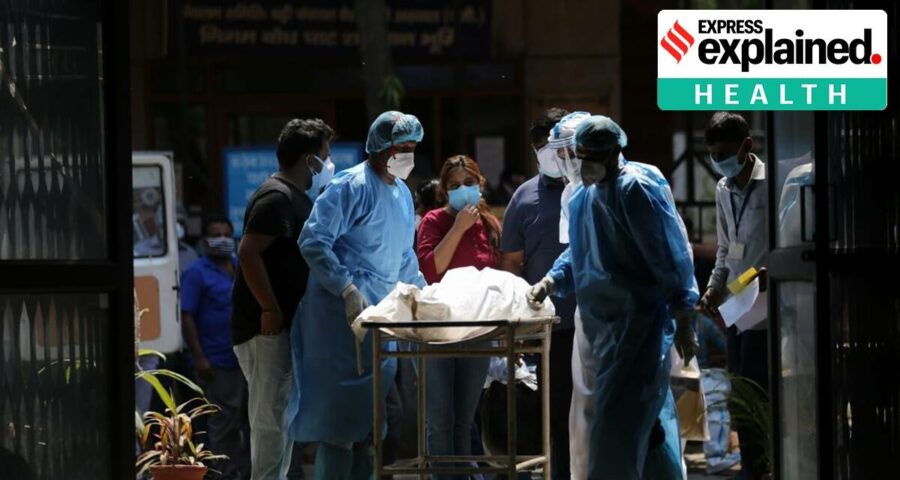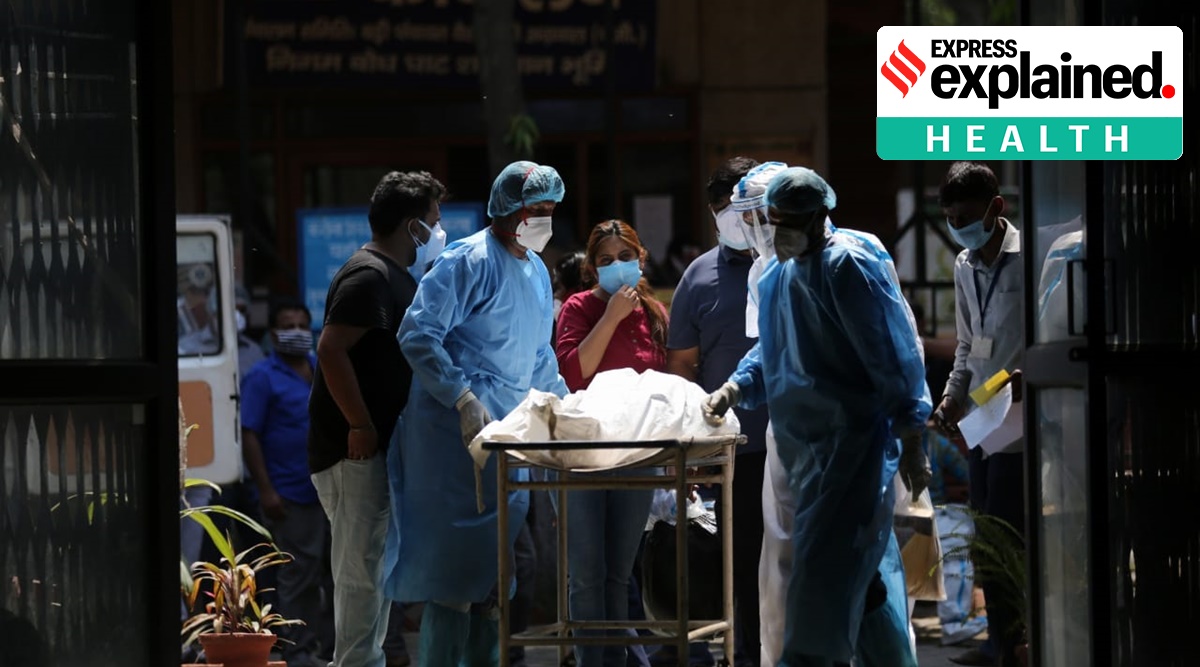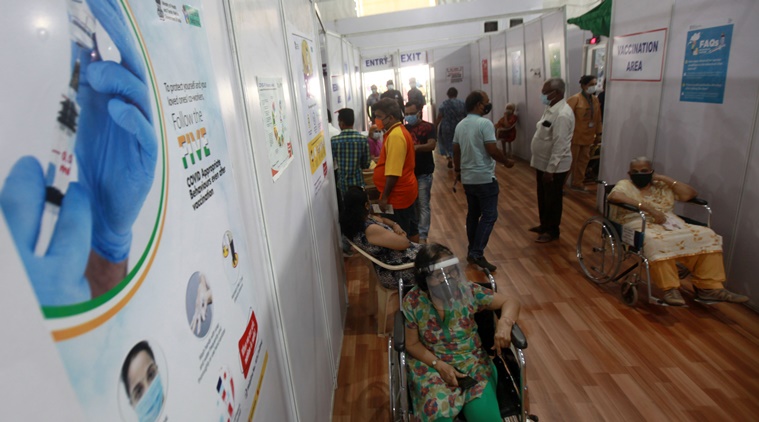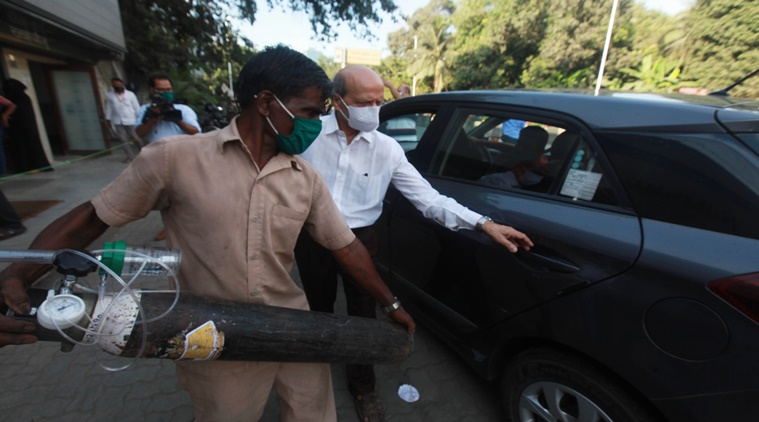The years of post-mortem that follow will dissect how we arrived here. But for now, the path out of the current inferno requires unwavering commitment to science, and perhaps tremendous rectitude. Let us examine what we can do in the coming months.
The response to the Covid-19 pandemic in India has been marked by sacrifice, suffering and valour. It has also been characterised by arrogance, ignorance, and by what a respected epidemiologist recently called, Indian exceptionalism.
Our exceptionalism seems to stem from a bizarre infatuation with magical thinking. In February 2020, India had supposedly dodged the pandemic because of “innate immunity.” By February 2021, we had conquered the pandemic. These delusions bookended a year of heroic struggles, sacrifice and loss, that could have at least somewhat been ameliorated by earnest submission to science, by both state and society.
Newsletter | Click to get the day’s best explainers in your inbox
The justified outrage at the decision to hold political rallies or religious mass gatherings must be accompanied by deep introspection. There is hardly a reader of this article that has not directly participated in unsafe behaviour, or does not know someone who has. Late in 2020, after the first surge, when there was near universal fatigue with the constraints of our new reality, many among those with means have pulled down their masks, travelled for a “break,” and hosted and attended lavish parties and weddings. After all, life had to be lived – “how long can we go on like this?”
The years of post-mortem that follow will dissect how we arrived here. But for now, the path out of the current inferno requires unwavering commitment to science, and perhaps tremendous rectitude. Let us examine what we can do in the coming months.
Avoiding the infection will require wearing the right kind of mask for uncomfortable and prolonged periods of time not only through the hot summer, but perhaps longer than a year, until vaccination rates are very high and incidence rates very low. This means widespread and regular distribution of cleverly designed affordable efficacious masks from the “war rooms” of our governments, with even more zeal than with which digital apps, immunity-boosters and unvetted drugs, were promoted. Masks, like vaccines, will be more effective in reducing transmission rates only when very large sections of society are compliant. As early reports from a study in Bangladesh have shown, mask compliance requires a constant drumbeat of distribution, messaging, reinforcement of good behaviour and some degree of community shaming. When the powerful – in any society – signal that it’s okay to be unmasked, the community follows suit. No one likes hypocrisy.
The medical fraternity, that continues to risk their well-being and lives, must also deliver scientifically sound treatment. All through the pandemic, peers in the medical fraternity, on the one hand have masked and gowned and bravely marched to work, and yet have said things as naïve as “I gave them hydroxychloroquine and they got better, so I know it works” or worse, “in India, we do things differently.” Apparently, the drug du jour is ivermectin. This kind of lazy intellect does tremendous disservice to the physicians adhering to good practice despite the mounting pressure on them to compromise. In 2021, the salience of randomised controlled trials in the practice of medicine is not the purview of ivory towers. It is Google-able.
It may come as a shock to readers that CT scans are seldom performed in the diagnosis or management of Covid-19 patients in Europe or the United States. The litany of tests and the cocktail of drugs that are being ordered in India today have little scientific basis. On July 15, Dr. Udwadia and I had written in this column, the rationale (and the absence thereof) for the drugs being peddled by many in the medical fraternity. Here is an update: Hydroxychlorquine, doxycycline and ivermectin are still not proven treatments for Covid-19. Vitamins and Zinc may be beneficial to your immunity in the long run, as is a healthy balanced diet, should you afford it. Injecting them after you have Covid-19 is not going to save lives. As has been known since April 2020, the vast majority of those that will get Covid-19 will be asymptomatic or have mild symptoms, and need no treatment. Steroids help those with moderate and severe disease, and according to a very recent study, perhaps those with mild disease as well. Anticoagulants (blood thinners) are given to hospitalised Covid-19 patients. Remdesivir has been shown to sometimes reduce the length of hospital stay in some severely ill patients. Tocilizumab may be helpful in severe cases, but not necessarily so.
Further information on the global scientific consensus on these drugs, including on monoclonal antibodies and plasma, can be found at: https://bit.ly/3awMLSp
If your beloved is ill, you obviously want to move heaven and earth to get these drugs, but understand that not having access to these drugs is not as damaging as withholding antibiotics from someone with TB or pneumonia, or not giving insulin to an insulin-dependent diabetic patient. These drugs have been shown to have marginal benefit, at best. None has unequivocally shown to decrease the chance of dying from Covid-19. Equal or more attention may instead be paid to the availability and delivery of oxygen, which will be far more beneficial in most cases. And to simultaneously treat all the other pre-existing heart, kidney and endocrine conditions one may have.
The health systems in our urban centers are completely overwhelmed, so much so that patients with mild symptoms want to pre-emptively (and entirely justifiably) get checked into hospitals to mitigate any risk of not finding a bed when they most need it. It is up to hospitals to triage – especially in the middle of this crippling surge and supply-demand mismatch – on the basis of clinical merit and not social favour. This is not a quixotic suggestion – it is the bedrock of any healthy health system. It is also what an equitable health system looks like.
Now is the time for the multi-tiered Covid-care centers that had been tested in 2020. The vast majority of admitted patients will only need oxygen, steroids and very close monitoring, which can be effectively done by rapidly training non-physician healthcare workers adhering to evidence-based protocols. These patients must be in close proximity to specialised care.
There are several anecdotal reports of folks getting infected after their first dose of vaccine. It is imperative that public health departments step up to communicate, over and over again, why this is not a failure of vaccines, why breakthrough infections are to be expected, why their incidence may vary from region to region depending on the type of vaccine and existing rates of infection, and how vaccines play a protective role even among those that get infected and exhibit symptoms. In our current hyperconnected culture, where vaccine hesitancy is rampant, we need to educate ourselves, and all around us on the critical role that vaccines will play, once available widely, in our exit strategy from this pandemic. And why masking must continue long after one has received the vaccine.
India has expanded its healthcare workforce capacity to test and treat Covid-19, but the kind of specialised care required for the moderately and severely ill takes years to build. A return to some semblance of sanity will require sustained self-restraint. Supply simply cannot rise to meet demand in this case. We just have to decrease the load on the system, as has been the singular objective of non-pharmaceutical interventions like distancing, travel restrictions and lockdowns, around the world. We should therefore wear masks like we mean it – covering our noses and our mouths, taking the effort to tighten the ear loops so the mask doesn’t slip down every few seconds compelling us to constantly touch it, ensure that all in our ecosystem have access to masks at all times (and this includes the families of employees, should our incomes allow it). We should meet, if we must, only in small groups, and outdoors. As the summer heats up, for those few that can afford the luxury of air-conditioning (or are dependent on it!), think hard about its consequences while entertaining folks indoors, from outside your bubble.
The virus, as we now know, makes no accommodations for Indian jugaad. A handkerchief draped on our chin is not a mark of our entrepreneurial spirit. Congregating in thousands is not a mark of faith. It is plain reckless.
Wash hands. Maintain distance. If there were ever an urgent time to reduce mobility and contact, it is now. We must resist the temptation to go out and congregate, despite 14 long months of suspended lives. Not doing so only prolongs our collective agony and loss.
All pandemics come to an end. Until then, who among us truly believes that any one or even all of these myriad inconveniences are not a better alternative to ferrying a relative from hospital to hospital in the backseat of our car?
Satchit Balsari is an emergency physician and assistant professor at Harvard’s medical and public health schools; and graduate of Grant Medical College, Mumbai.
Source: Read Full Article




